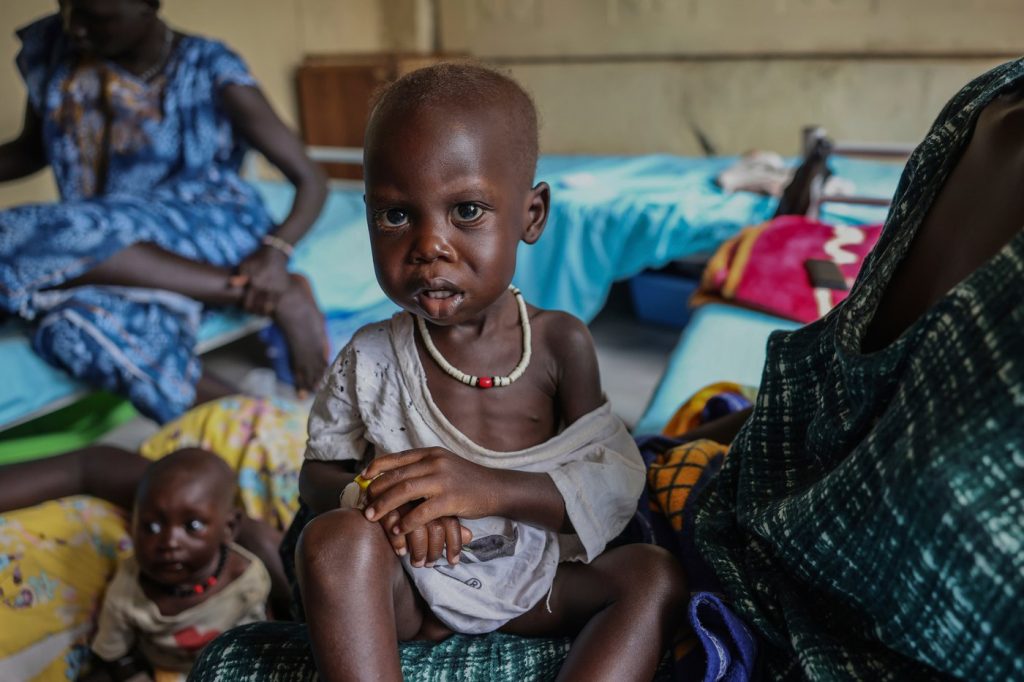JUBA, South Sudan (AP) - At just 14 months old, Adut Duor is unable to walk due to severe malnutrition, his spine protruding through his skin as he sits limply on his mother, Ayan's lap. He is half the size of a healthy child his age, underscoring the dire situation faced by many in South Sudan, particularly among the 1.1 million malnourished pregnant and lactating women. Ayan expressed her despair, stating, "If I had a blessed life and money to feed him, he would get better."
A recent United Nations-backed report indicates that approximately 2.3 million children under the age of five in South Sudan require treatment for acute malnutrition, with over 700,000 of those in severe condition. This alarming increase is attributed to a resurgence of conflict in northern counties and a decline in humanitarian assistance. Since its independence in 2011, South Sudan has been plagued by violence and poor governance, with allegations of government officials looting billions of dollars in public funds. The U.N. reports that 9 million of the country's nearly 12 million people depend on humanitarian aid, and the ongoing funding cuts, violence, the impact of climate change, and entrenched corruption are exacerbating the hunger crisis.
Inside the basic ward of the Bor state hospital, mothers cradle their frail children as cases of malnutrition have more than doubled this year, worsened by recent staff cuts. In the wake of funding cuts earlier this year, Save the Children laid off 180 aid workers, including key nutrition staff. This has led to a critical deficit in supplies of ready-to-use therapeutic food (RUTF), previously a lifeline for malnourished children. Action Against Hunger's Country Director, Clement Papy Nkubizi, warns of dangerously low stocks, revealing that 22% of children treated for malnutrition at Juba's largest children's hospital have died of hunger.
The ongoing violence, particularly in South Sudan's northern states, has further complicated aid delivery, blocking humanitarian access and displacing hundreds of thousands from their farmland. Despite a 2018 peace deal that ended a five-year civil war, renewed clashes between the national army and militia groups have raised concerns of a return to large-scale conflict, especially in areas like Upper Nile State, currently experiencing the highest levels of malnutrition. The U.N. reported that intense fighting in May prevented supplies from reaching these areas for over a month, pushing over 60,000 already malnourished children into deeper hunger.
In response to the violence, the South Sudanese government has turned to private companies for airdrops to meet the needs in conflict-affected regions. However, U.N. workers have raised concerns about this shift away from established humanitarian protocols. Flooding in the country further compounds the crisis, with approximately 1.6 million individuals at risk of displacement due to submerged farmland and failed harvests. Shaun Hughes, the World Food Program's regional emergency coordinator, emphasizes the multifaceted nature of malnutrition, which is aggravated by prevalent health issues like cholera, malaria, and poor sanitation.
At Maban County Hospital, the situation is similarly grim as eight-month-old Moussa Adil cries out in hunger, with no supplementary milk available. Funding cuts have drastically impacted international aid efforts, leaving health workers unpaid for six months. The ongoing conflict in neighboring Sudan has also disrupted trade, driving up prices and pushing 92% of South Sudan's population below the poverty line. Action Against Hunger recently halted school feeding programs due to funding withdrawals, increasing risks for children slipping into severe hunger.
Critics of the government highlight that years of aid dependence have left South Sudan vulnerable, with only 1.3% of its budget allocated to health—far short of the 15% target set by the World Health Organization. The U.N. Commission on Human Rights in South Sudan has reported significant corruption, with public officials reportedly siphoning off billions intended for essential services. The Commission's chairperson, Yasmin Sooka, declared that corruption is the driving force behind South Sudan's collapse, exacerbating hunger and preventable deaths among its citizens.
As the international community warns of a worsening crisis, the humanitarian toll continues to rise, impacting the lives of children like Moussa and Adut. The landscape of South Sudan serves as a stark reminder of the urgent need for effective governance, increased humanitarian aid, and decisive action to address the root causes of malnutrition and food insecurity.











